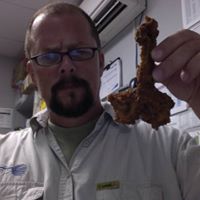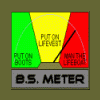Leaderboard
Popular Content
Showing content with the highest reputation on 10/30/2009 in all areas
-
Yes I know this is in the funny section but I have spent many hours getting patients with severe disabilities home and have tried to work with various agencies and professionals to make the transition go as smoothe as possible. It is not always a matter of "coping" but rather results of a traumatic brain injury that can bring about a personality change. Many family members are often shocked or ashamed of their loved one's different behavior when they do start responding after a traumatic injury. Some abandon their loved ones to where some of the rehabilitation is affected without their support. Let's look at this from the perspective of a rehab facility. Having our patients laughed at is one of the fears we do have when we are preparing our patients for as much independence as possible. Unfortunately services like Lifeline are not perfect and instead of notifying their appointed primary care giver, they call 911 only to put our clients through a situation like this. While the patient may seem to take this in stride, the remarks made on scene do affect them and they try to make light of it in spite of their embarrassment. When they gather for more training or group support, I am often saddened to hear how some have been treated especially when they are not always in control of who their Life Alert or LifeLine system notifies. Instead of taking it as a big joke, especially with the new EMS provider, maybe some education and some notes on how the notification system could be improved might be in order. We are always looking for suggestions to work with the various agencies such as Life Line (or whatever in the area) and EMS to make our patients' transition back into some type of independent living successful. Nothing like a bunch of snickering FFs to undo months of work toward building the confidence of someone who must live with a broken body. Do whatever you can to improve the system instead of just complaining or laughing about it at the patient's expense of possibly losing what freedom they do have because of a poor system function. We still have a lot of patients and are getting more each day that would like to have a chance at independence even when severely disabled.3 points
-
On the bright side, this show did give me a great idea for a costume for the Halloween party at medic school... I'm going to wear a jumpsuit with the sleeves rolled up to my elbows and a pair of aviators and walk around arbitrarily injecting people with versed!2 points
-
Too bad they probably won't drop another $3 million to make a proper finale. My number one choice for a finale would be to watch them all hit the unemployment line at midnight when AMR takes over.2 points
-
I agree... I can't stand crochity providers who grumble about the service call to assist a patient. For me, it is their emergency and if I am ever in that situation where I can't get to bed by myself, I would hope caring individuals would come and assist me and not make fun of me or laugh about me behind my back. I get very angry when people assume an elderly individual can't hear them when in fact many have great hearing and hear the derogatory comments made about them. I am 100% with you on this one vent...1 point
-
1 point
-
Looks like you are hitting all the EMS forums today with your message. I guess I'll repeat myself on this forum. In all fairness why don't you post a comparison of other transport services in your area to see if benefits, wages and bonuses are similar? Even in the SF Bay area, it is difficult for an EMT to demand much for wages. Realistically, 3 months of training and "BLS" care for 4 or 5 patients per day doesn't bring in the big money. With the short time for training and the many tech schools mass producing EMTs every 3 months or less, there is an abundance of EMT-Bs in the area just waiting for a job that at least offers a paycheck and/or health insurance. Many laid off and well educated people from Silicon Valley are now working as EMTs after a quick course just to keep their families insured and bring in some money. Some are just trying something different while inbetween employment contracts. Of course they will probably return to their other careers and lifestyle once the economy in that area picks up. If you don't like your job you can try to go elsewhere but as an EMT-B you might be limited.1 point
-
I have spoken with a couple of flight team members from REACH and they have not been amused by this show at all. They do bring patients to SF from outlying areas by landing outside the city. Unfortunately for them their jumpsuits are very similar to the one on the show. But then, they also stated not many health care professionals in the hospitals have watched the show and most of the ignorant comments come from the EMT(P)s in the amubulances that transport them to and from where they must land. This show should have been promoted as a comedy or spoof of EMS rather than a drama of the producers' version of reality.1 point
-
I've been thinking a lot lately. Many of you know that I do search and rescue for my county... and as such, we often work with the smaller rural fire departments in our area. I know a lot of us have lamented the problem of volunteer EMS (whether or not it is attached at the hip to fire) as a major factor in holding back our profession in terms of respect and wages and so on and so forth. I've come to the realization that we will probably never be able to completely eliminate volunteer EMS. Many of the rural areas are simply just too small to make it financially viable to go fully paid and to acquire the number of paramedics that it would take to staff shifts 24-7. That leaves us with a bunch of volunteer FF/EMT-B types in the areas where we could best use ALS level care, which is frustrating for many of them and a disservice to many of our rural communities. Here's the idea I've been kicking around in my head. What if we changed the approach a little bit? What if we used physician extenders in these rural areas? The advantage to having an NP or PA respond on EMS calls is that they are better educated than paramedics and can do things that might be beneficial on a long transport (or in a situation where you know you can't get the patient out until the snow stops), and they can also operate with regard to certain procedures and pharmacology without a direct order from the MD they are working under. They can also easily take care of minor things, like sutures or prescribing antibiotics. An NP or PA could staff a clinic during "normal" business hours, providing a closer source of medical care and potentially eliminating some issues that would have been an ambulance call with the status quo in many of these areas. Someone who wanted to provide care in this setting would have to enjoy clinic work, and would have to be affiliated with the closest hospital, rather than being a direct part of the FD; for ambulance runs, they could operate just like everyone else, carrying a pager and responding when available (aka: not currently caring for a patient in the clinic). It seems to me that it would be far easier to convince people to pay for the salary of someone who would be serving the community to a much greater extent than just responding to "emergency" calls. From the sociological perspective, the FD would be able to retain its position and still be very useful, but not be solely responsible for medical care (which we can all see isn't working). I think a lot of FD's would be much more amenable to this arrangement than having a bunch of their folks (who don't want to be paramedics) forced to become medics, or have external medics integrated into the infrastructure. The NP/PA isn't as much of a "threat" since they're not there to completely change how everything is run and aren't interfering at all on the fire side. So what do y'all think? Am I way out in left field? Could it be feasible? We'd have to set up educational programs specifically geared to give the NP/PA prehospital experience, and candidates coming out of those programs would have to have a significant interest in working in rural settings. Let me know what you think. Wendy CO EMT-B1 point
-
SWEET! Honestly I missed Chuck, and Trauma made me want to ..... well... upchuck. I suppose I was entertained but I'm guessing not in the way the producers would've liked. I laughed at the show, not with it. Have you ever wondered if spies and other government agents watch Chuck, and Laugh as much as the EMS community does while watching Trauma?1 point
-
To the producers......please, please, please do not try to cardiovert this show back into a sustainable program.......oh yea, I guess they are not viewing this forum, or they would have done a much better job. Just like one of those patients....ah, shows......that will inevitable die a peaceful death despite proper care.......in their instance, improper care/production. Note to self.......Do not watch the reruns.1 point
-
1 point
-
That applies to every patient you see throughout your entire career. Doesn't matter if you did everything right or not. That won't stop a blood-sucking lawyer from going for a settlement anyhow. But I don't mind noting that, in thirty-five years of practice in both EMS and nursing, I have yet to ever be involved in a medico-legal suit over a patient. Not that I don't make mistakes. I do. But even today, the chances of actually ending up in litigation over a critical EMS run are practically non-existent. It's the little runs, where they live, that you have to worry about. Dead people don't sue.1 point
-
I am currently reading Stiff by Mary Roach. The "life" or well afterlife of cadavers and how they are used for science. To study numerous things. Decomposition,accidents,embalming and more are discussed in this book. It is also written with humor as well. Also Memiors of a flight nurse is good. I do not remember who the author is. The Peter Canning books are good as well. Lastly Emergency. I believe it is called by a ED Md. Stories of patients in the ED setting by various physicians.1 point
-
Seriously, wtf is that all about? I like to think a lot of those were just accidents, because otherwise it makes zero sense. I know I've done a couple of accidental plus or minus points while meaning to click something else, like the reply button. Anyhow, I used to not read because of my ADD. Now that the ADD is cured, I just don't have any motivation anymore. It's a curse. I may give Kelly a read though, because I do enjoy his blog and articles, and he's good people. One of the few that seems to "get it".1 point
-
I think it's important to decide why you messed up, and why it's effecting you so severely? I mess up something on every call. I know, as I find something else I wish I would have done, or asked, or discovered while reviewing them later. That doesn't destroy me for two reasons. One, I'm never likely to be perfect, so I review each call to help guarantee that I'll be the best that I know how to be next time. Second, in my opinion, EMS is a learning environment. On the most critical calls I rarely have as much time as I'd like, nor access to the amount of competent help that would allow me to perform at the level that I would like. But you know what? It's the gig I signed on for, I don't really deserve the luxury of having people pat me on the back for my mistakes...I learn from them, make sure others have the benefit of learning from them, and then move on. Did you miss something because you don't have a good plan for running calls? Were you tunnel visioned by one thing, causing you to ignore something else? Did you trust part of care to someone else that didn't follow through? All of these are correctable, none of them should cause the kind of angst you're showing here. Why did you miss what you missed? Answer that question, and then follow Kaisu's advice and make sure you don't do it again. That's kind of how this game works brother. I'm not sure what level you're working at, medic/intermediate/basic but I'm guessing that you may be overstating things just a bit as well, and that's certainly easy to do if you don't have a lot of experience. It's a rare thing when we make a massive difference in the mortality of our patients in pre hospital environment, and even more rare when a 'slight error' (.01 % I think you said?) would have made any difference at all. Is it possible that what you're agonizing over is the difference between your treatment and following the protocols to the letter? If so, then you should stop that. It's simply making you miserable and not producing anything positive. I'm sorry I don't have more sympathetic things to say, but not discussing the call really only leaves room for general advice and shotgun sympathy. The first I gave my best shot, the second won't really do anything but make you a weaker person and less potent provider, so I'll let it alone. I hope you find whatever it is you're looking for. Dwayne1 point
-
1 point
-
Everybody should make their own decision about the vaccine. I don't believe that any vaccine should be mandatory UNLESS failure to vaccinate puts the rest of the population at risk. I remember, as a grade schooler, going to my elementary school and getting the flu vaccine in the 1960s (it was mandatory). I am taking the shot as soon as I get to Las Vegas early next week. As a group of emergency physicians (at UNSOM), we decided not to take the nasal vaccine because it is a weakened (attenuated) form of the H1N1 virus and we were afraid that we would shed some of the virus which might adversely affect some of our patents who may be immunocompromised. But, we are taking the injection. I am making sure my two kids (in their 20s) and my son's pregnant wife (also in her 20s) get the injection vaccine. I intubated two people last shift at UMC who had H1N1. I had one patient, a male in his 20s, who was in the hospital for 7 weeks, spent 5 weeks on the vent, had bilateral chest tubes, a DVT, and ARDS. He was low sick. This H1N1 is scary and if you are in your early adult years or pregnant, you should be concerned. The Obama administration has done a horrible job of providing information about the H1N1. While in Texas last Friday (I am in San Jose now), the TDSHS web site showed that two pharmacies near my Texas house was supposed to have the vaccine. I went by both to try and get the vaccine for me and my family. Neither pharmacy had the vaccine and neither knew when they would get it. It is available in Clark County, Nevada. Go figure. I was in Mexico when this H1N1 emerged several months ago. The way it affected children in the Mexico City area was scary. Although the predominant strain in the US appears to be less virulent than the one on Mexico City, it is still a bad deal. Vaccines save lives. If you give people enough of a substance, be it vaccine, drug or placebo, a few will have an adverse effect. This does not mean that the vaccine is dangerous. The links between childhood vaccines and autism are pseudoscience. Far more kids will die from not being vaccinated than will suffer ill effects from the vaccine itself. Look at the evidence and make your own decision. I, for one, will get my vaccine next Monday.1 point
-
I can't find the link, but a person with the CDC said that if the H1N1 had started about a month earlier, it would have been included in this year's seasonal flu vaccine and no one would have known any better. Because we are suddenly developing this "new" drug people are up in arms. I hate to say it, but Crotchity was right. We've been doing this flu vaccine for years and have it down pretty well. Some years we miss the boat and then we have the abberancy seen in the 70s. Let's think of this another way. The rate of a reaction such as Guillanne-Barre is 1-2 per million. Let's say we vaccinate every American, which is currently about 307 million people. So we expect to see 307-614 GBS like reactions. This is a 0.000001% chance of having an adverse event. In a normal flu season, approximately 36,000 people die from flu-related causes (from CDC website). So, in an average year you have a 0.0001% chance of dying from the flu (this does not include other serious problmes such as pneumonia, organ system failure, need for intubation, etc). In an average flu season, you are 100 times more likely to die from the flu than you are to have a GBS like reaction to the vaccine. Another eye opener is the mortality associated with the flu this year. The following is a list of the number of deaths in children due to the flu in a given flu season (CDC website): 2004-2005 47 deaths 2005-2006 46 deaths 2006-2007 76 deaths 2007-2008 83 deaths I don't have the data for 2008-2009. So far, this year there have been 95 pediatric deaths and we haven't even hit the usual start of the flu season. I'm not trying to preach, just lay out the facts and show why I have chosen to get the vaccine for me and my kids. I'm not the doomsday, end-of-the-world kind of person, but this scares the hell out of me, especially since it deals with the health and safety of my kids. As someone else said, the "stomach flu" is not the flu. It is just a virus that causes GI symptoms and is not related to the influenza virus. Flu shots will not stop the stomach flu. I do have a problem with making the vaccine mandatory. But, I'll leave you all with a question to consider. Let's say we cannot make the vaccine mandatory. Do health care facilities/ambulance services have to right to tell you not to come to work? I'm not talking about firing you, but saying, "You have the right to refuse the vaccine, but we have the right to protect our patients and do not want anyone who has not been vaccinated working in a patient care postion."1 point
-
Several people keep bringing up the fact that the H1N1 vaccine has not been fully studied. With any medication, the final phase of the study is on a large human population. There is no way to really study a medicine until it is released on the population. This is why things like the cardiovacular effects of the COX-2 inhibitors (Vioxx, etc) were not know until after they were released. In phase 3 of the studies you are only testing the drug on several hundred to several thousand people. Sometimes, because your sample size is limited, problems such as the cardiovascular effects cannot be seen. Also keep in mind that everything we do in medicine carries some risk, giving aspirin and tylenol, intubation and even recieving your regular vaccines (Guillane-Barre anyone?).1 point
-
So you are not worried about a repeat of the 1918 flu which killed 60 million people? It started out rather benign in the spring and was quiet during the summer. Once fall hit it came back with a venegnce and was killing young, healthy people. Was this a one time thing or is history due to repeat itself?1 point
-
What I find to be so 'amazing' is this: The very same people that are snapping up anything even remotely associated with Michael Jackson were the SAME PEOPLE that couldn't be bothered to spend one thin dime to buy his music, memorabilia, paraphernalia, etc! Kind of like when the twin towers were brought down….those that screamed the loudest with ‘patriotic indignity’ were the very same people that couldn’t be bothered to serve a day in the U.S. military! It’s actually very disheartening to see just how hypocritical people in general really are!1 point
-
Agreed. There really was potential there. But unfortunately, it was put into the hands of someone with zero interest in EMS. Hitler was right. We need something like "Emergency!", but updated to modern times.0 points
-
I applaud you for throwing your ideas out there, if more people acted like you did, instead of just throwing their hands up in the air, and saying we cant fix it, EMS would be alot better. The problem with your premise, as I see it, is: 1. You have to have EMTs and medics to make it a licensed ambulance so you can get reimbursed. 2. You will have trouble getting PAs to work in the rural area. Most rural areas would love a PA to function as a PA , but they cant find them. I would offer three different suggestions: 1. Start with a basic service with paramedic on call, and do the non-emergent transports in your area to supplement revenue. You could pay someone to work 8 hours and still be volunteer at night until you got your call volume up. 2. If you have a hospital, use them to fund it, and use the EMTs/Pmdcs to work in the ER when not on call. The hospital gets some hands to help them, which they would pay more to hire RN hands, and you get some financial backing to get your paid service up. 3. Create a multi-county paid department. If you are that rural, the county on either side of you probably cant afford a service either; so none of those counties might be able to afford 100% of the bill, but maybe they could afford to pay a 1/4, 1/3, 1/2 of the cost ?0 points
-
News flash Micheal Jackson died of food poisoning. He swallowed a twelve yr. old nut.-1 points
-
DUH NO ? ABOUT IT OF COURSE IT SHOULD BE MANDATORY-1 points
-
If this is a legitimate post - it sounds as if he has tried to throw it into the americans with disabilities act. If that is the case and his employer has made the accomodations he states - that is more than any employer I am aware of would ever make at their own expense (paying for custom shirts - get over it - I had to have my pants tailored because of how my body proportions are - I'm not fat but have a bum and our pants weren't meant for someone with one so I had to have the waist taken in and darted to fit me and look respectable at my own expense). Americans with disabilities act only states they have to accomodate as long as all essential job functions can be met with or without reasonable accomodation and without unreasonable economic hardship to the facility. I think any other accomodation could qualify as economic hardship and if he is at a size that he cannot function within an ambulance, then he is not able to perform his job functions making him eligible for termination. I do not feel his employer is out of line to state he must maintain a healthy weight that he is able to perform his job. In EMS it is for our patients safety as much as ours to stay fit and healthy. If he is as large as he states, then I don't see how he can safely and effectively lift a stretcher or perform many of the other tasks. I've worked with some larger partners (one in particular was almost 400 lbs and employed by a large FD in the area as well). He was healthy for the most part but on yearly physicals he was starting to have some issues and was told he had to take care of himself or else his employment wouldn't continue. He was no longer allowed to make entry on fires due to his size and if he were to go down, they would not be able to get him out quickly. He took the steps to take care of himself and says he feels better than he ever has. I highly suggest that he go and see his physician and discuss alternatives if traditional diets have been followed and still no success. Also - got to remember to put exercise in there !-1 points
-
Seriously? Someone is dinging our reputation points for this thread? I figured it wouldn't take long for some ass to start abusing this system. It would be nice to know why.-1 points
-
I would tell you to kiss my butt but I don't want DNA from the many people that you keep your lips pressed tight on, might give me some disease. I speak my mind no matter how unpopular. Sometimes my opinions same as some often its not. I just see no reason for such a cowardly attack.-1 points
-
I could have bet my mortgage you would respond to this with a holier-than-thou post. You did not disappoint. Do you require people to avert their gaze when they meet you? Just wondering.-1 points
















